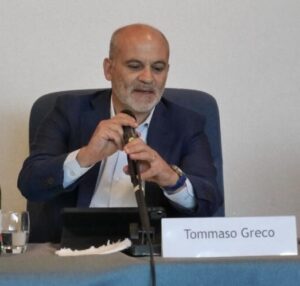“Every encounter, every odor of the streets, everything serves as a pretext for loving without measure”: these words from Camus resonate deeply in our soul, as we reflect on the beautiful theme, the city, which Tonalestate suggests in this unusual 2020.
For several months, we all had the opportunity to watch our cities empty of people and lives, where only the sirens of ambulances or the blinking of weak police cars in front of the emergency could break a dark, gray torpor.
And in that unnatural silence of theirs, we thus recognized, perhaps for the first time, the hidden threads that unite ours to the suffering of others. The cities, in fact, were dripping with this common sorrow, which even managed to silence the petulant rumble of the news, or the acres, arrogant, miserable words of those who did not care at all if their speech was the source, around them, of death or life.
Then, as they emerge from that unnatural silence, the cities have gradually restored their faces, flirty and distracting, filled with wrinkles caused by the youthful nervousness of those who want to arrive quickly and by the old slowness of those who have already walked too much.
Looking at this city relive, at their rhythms and with the sounds that are known to us, it has to be said, paraphrasing Péguy, that there is something worse than building a bad city and is building a ready-made city, that is a city designed at the table, a city that has been approved as the flush villages of the western neighborhoods, with their tiny garden, their two little trees, and the perfume (this, yes, it must be recognized, delicious) of the basil, watered with care just before the night falls, to cover the excess of wounds of the human heart..
The city is, and will always be, to be rebuilt, and we would like, as John Bunyan tells us in the sentence of the manifesto, that every city should always be a foretaste of the Heavenly Jerusalem, that is a place of coexistence whose streets are not streams of loneliness, precisely because they are paved with the gold of the peaceful and laborious solidarity in which every man wishes to be part of.
The city, whether it is made of “three little houses with sharp roofs, a microscopic village” like Rio Bo poem, or an endless succession of neighborhoods like Lagos, or an endless stretch of shacks where the world’s poorest are hiding and where people live beyond the limit of human endurance, is always and only where people, who wish to build together, without slavery or anarchic frenzy, live: and this is exactly what the image of the manifesto, in that harmonious scene, painted by Spinello Aretino, of the foundation of Alexandria, suggests.
In order to rebuild the city, there is no need for urbanists; we need men who can say (as Italo Calvino makes Marco Polo say in the Invisible Cities): “In a city, you do not enjoy the seven or seventy-seven wonders, but the answer that it gives to your question.” We must therefore learn to ask questions, just as we must have the courage and the passion to take the initiative, where we are.
But how do you get it? By what method? With what “spirit”? What sources do we use to transform our neighborhoods, villages, cities or megalopolises, so that they are respectful of people and identities, and so that they are always a response to real and un-manipulated needs?
What value will we give in these spaces to the silence and talk, to gather and to live in a positive loneliness? What chance will we leave, where we are, to be able to see the stars every night again and again, and sometimes to hear the wind that makes the horizon clear as it cures the inevitable wounds of life?
Will we allow the laws of the state and the market to decide where and how to we live?
And will our desire for true humanity, for a deep sense of justice and beauty, be overcome by the forces that now make cities or a place of tourism, or a single infinite outskirts where, says Pasolini, the city “begins again as an enemy, and begins thousands of times again, with bridges and labyrinths, behind barricades of skyscrapers that cover the whole horizons”?
What we need to take seriously is that the city we live in needs to be built together. this is the only way that the urbe will never be, for those who live it, a betrayed urbe (i.e. an unfulfilled promise), but it will be a thrived urbe (i.e. faithful to its origin), a city that shines, in their eyes and ours, “like the sun”.
And only in this way will it not be unanswered (but rather a constant provocation to love the imperfect perfection of life) the question – “Where can it be – This land of Eldorado?” – that the wandering knight of Poe’s poem (from which two verses were collected and placed under the subtitle of our manifesto) is not afraid to pose, so deep was his desire to meet that land where mystery and hope can walk together.

Tommaso Greco (professore di Filosofia del Diritto, Università di Pisa)
TOMMASO GRECO è professore ordinario di Filosofia del diritto del Dipartimento di
Giurisprudenza e direttore del Centro Interdipartimentale di Bioetica all’Università di Pisa.
Le sue ricerche sono orientate prevalentemente alla storia del pensiero filosofico-giuridico, al
rapporto tra diritti e doveri, alle dimensioni relazionali del diritto e alla teoria della scienza
giuridica. Una figura su cui si è molto concentrato è quella di Simone Weil.
Fa parte del CISP – Centro Interdisciplinare di Scienze per la Pace, e del Laboratorio di
cultura costituzionale dell’Università di Pisa. Dirige la collana “Bobbiana” dell’editore
Giappichelli e la rivista di storia della filosofia del diritto “Diacronìa”.
Ha partecipato a Tonalestate nel 2022.